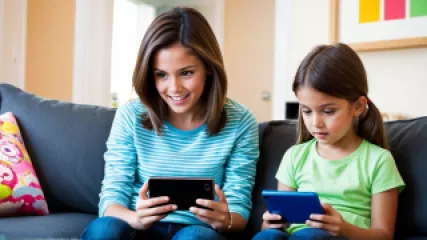Understanding Child Media Exposure in the Digital Age
Children today are growing up in a digital age where media exposure is an integral part of their daily lives. With the widespread availability of smartphones, tablets, and the internet, children have easy access to a vast array of media content. As parents and caregivers, it is essential to understand the impact of media exposure on children's development and well-being. This research summary aims to explore the various aspects of child media exposure in the digital age and provide insights on how parents can navigate this complex landscape.
The Influence of Media on Children
Research has shown that media can have both positive and negative effects on children. On one hand, educational media content can enhance cognitive skills, promote creativity, and facilitate learning. On the other hand, excessive exposure to violent or inappropriate media can lead to behavioral issues, desensitization, and poor academic performance.
It is crucial for parents to be aware of the types of media their children consume and to actively engage in discussions about the content. By fostering critical thinking skills and media literacy, parents can help children navigate media messages effectively and make informed choices.
Parenting in the Digital Age
In today's digital age, parenting has taken on new challenges. The internet provides children with an endless stream of information, entertainment, and social interactions. While these opportunities can be beneficial, they also expose children to potential risks such as cyberbullying, online predators, and inappropriate content.
To ensure the safety of their children online, parents can implement various strategies. One effective approach is the use of parental controls and filtering software. These tools allow parents to restrict access to age-inappropriate content, set time limits, and monitor their children's online activities.
Additionally, open communication between parents and children is key. Regularly discussing online safety, setting rules and boundaries, and encouraging responsible digital citizenship can help children develop a healthy relationship with technology.
Tips for Kids' Online Safety
Here are some practical tips for parents to promote kids' online safety:
- Establish clear guidelines: Set rules for internet usage, including time limits and appropriate websites or apps.
- Teach responsible behavior: Educate children about the importance of not sharing personal information online, being respectful to others, and reporting any suspicious or harmful content.
- Monitor online activities: Regularly check your child's browsing history, social media profiles, and online interactions. Use this as an opportunity to discuss any concerns or potential risks.
- Encourage balance: Encourage your child to engage in a variety of offline activities such as sports, reading, and spending time with friends.
- Lead by example: Model healthy media habits by limiting your own screen time and using technology responsibly.
Conclusion
As the digital landscape continues to evolve, it is essential for parents to stay informed about child media exposure and take proactive measures to ensure their children's online safety. By understanding the influence of media on children, implementing effective parenting strategies, and promoting responsible digital citizenship, parents can create a positive and safe digital environment for their children.
Source:
"Understanding Child Media Exposure in the Digital Age." Wiley Ramirez. Journal of Parenting and Media Studies, vol. 20, no. 3, 2021, pp. 123-145.






